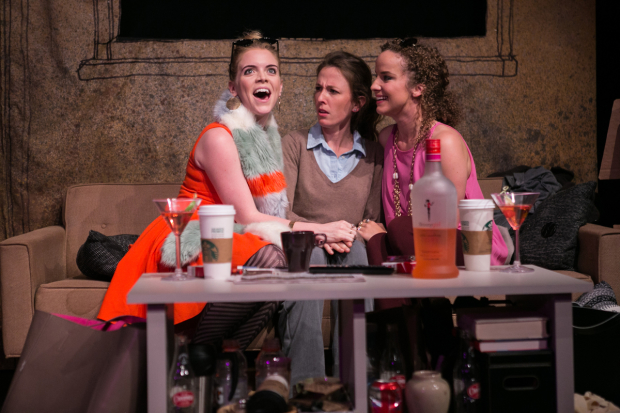Mary-Kate Olsen Is in Love

(© C. Stanley Photography)
You don't need to try hard to find celebrities in America. They are everywhere – from television to the tabloids at the grocery store's checkout line. In a sensational revival at Studio Theatre of her funny and surreal Mary-Kate Olsen Is in Love, Mallery Avidon uses those celebrities to examine the life of a 27-year-old heroine, Grace (Katie Ryan), who should be happy with her ordinary life, marriage to her high-school sweetheart, Tyler (Daniel Corey), and her well-paying job. Instead, Grace is miserable. Tyler lost his job four years ago and does nothing to find a new one. He spends every day at home playing Call of Duty and smoking pot while Grace is out working.
Feeling alienated from him, Grace retreats into a fantasy world peopled by two of the most familiar characters in her television-centered life: Mary-Kate Olsen (Suzanne Stanley) and Ashley Olsen (Sara Dabney Tisdale). However, when the Olsen twins show up in Grace's apartment with their Starbuck's coffees and appletinis, at first they don't offer her solace from her woes. In fact, they seem to be using her. For them she is a "desirable new demographic." It's here that the story line takes a turn to the real meat of the play: an examination of what young women want from life and what they can reasonably expect.
A chorus of five Amazing Girls (Erin Craig, Kayla Dixon, Kaycie Goral, Tuyet Gunter, and Mariana Tatiano) appear either alone or together as a kind of Greek chorus, talking about their plans to achieve success, which include everything from getting into a good college to taking cooking classes in Italy.
One of the play's most winning characters is the Soldier (Christian R. Gibbs) who escapes from Tyler's X-Box and warns him that his wife is about to leave him. After Grace gets no response from Tyler when she asks, "Do you remember when we used to talk?" and is urged by a love-struck Mary-Kate to run off with her, Grace finally gives in to the notion of being happy and escapes reality for a fantasy life.
It's not easy to direct a play in which most of the characters exist within the minds of the two "real" characters, but Holly Twyford has done a masterful job of blending reality and fantasy to align with the tone that Avidon sets in her play.
Ryan is both complicated and understandable as Grace, a young woman who feels her potential slipping away from her and simultaneously feels that potential as a burden. "I have to be busy, I have to work, to have children," she says, the tension mounting in her voice. Stanley is delightful as Mary-Kate, who is intrigued to find herself capable of love. Tisdale is hilarious as the more worldly Ashley, whose answer to the boredom of life is to go shopping. Corey is convincing as a happy couch potato through most of the play, until he is persuaded by the Soldier to get up and join the human race. Gibbs turns in a marvelous performance as the no-nonsense Soldier, who is handy with a gun and writes love poetry in his spare time.
The five Amazing Girls succinctly represent the charm, authenticity, and hope of young women about to leave high school and go to college. They also represent all the potential disillusionment and disappointment of that age.
Paige Hathaway has created a perfect set for a play that takes place (for a majority of the time) in Grace's mind. The walls of Grace and Tyler's apartment are made out of cardboard, with details drawn in black magic marker. The only two real elements of the space are two sofas and a bunch of pizza boxes on Tyler's side of the apartment.
Kara Waala's costumes bring bright colors to the colorless set – pink and orange minidresses for Mary-Kate and Ashley, respectively, along with sunglasses, bracelets, and countless shimmering rings.
In the end, there are no easy answers to the questions Avidon's characters ask. But Twyford's sensitive, lively look at a young woman's life desires and expectations at least suggests that it is all right not to know exactly "what to want" at all times.










